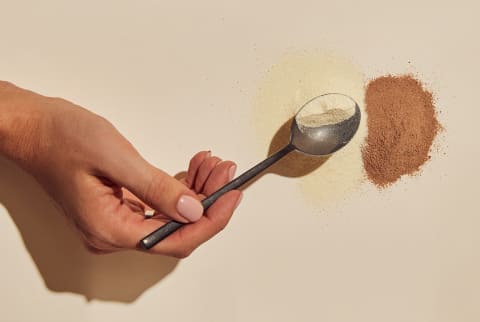Advertisement
Turns Out There Is A Best Time To Take Collagen Supplements


Some vitamins should be taken with food, others first thing in the morning, and for some (or rather, most), it doesn't really matter.
Up until recently, collagen was in that latter category. However, new research suggests one time frame may pack even more benefits than just skin aging support.
To come, those findings, how to work collagen into your routine, and a tasty recipe to try.
Why collagen may be best taken before bed
A study published in the European Journal of Nutrition found that collagen peptides reduced awakenings and improved cognitive function1 in a group of athletic males with reported sleep concerns.
The study utilized a randomized, crossover design involving 13 participants who consumed either 15 grams of collagen peptides or a placebo one hour before bedtime for seven consecutive nights.
Sleep quality was assessed through subjective sleep diaries, wearable technology, and a sleep study. Additionally, cognitive, inflammatory, and endocrine functions were measured, along with subjective sleepiness and fatigue.
"This is the first study to show that [collagen peptide] CP supplementation may reduce sleep fragmentation in athletic males and suggests CP could be used as a non-pharmacological strategy to enhance sleep quality in athletes, and potentially other populations with sleep complaints," the researchers said in a news release.
The reason behind the correlation, however, is still unknown. "The main mechanism by which we hypothesized CP would modulate sleep quality and architecture was related to its high glycine content and effect on circadian rhythms," researchers speculate.
Glycine is a major component of collagen and is also found in red meat, peanuts, dairy, and seafood, to name a few. Previous research confirms that glycine improves sleep2 by activating NMDA receptors in the SCN, which regulates circadian rhythms and lowers the nocturnal core temperature, backing the team's suggested explanation.
With improved sleep comes improved cognitive function, as countless previous studies have confirmed. As for whether the collagen peptides boosted cognitive function unrelated to sleep, we'll need more research.
Editor's note
A quick sleepy-time latte recipe
Of course, not every collagen supplement is suited for a pre-sleep ritual. Do your best to avoid powders high in sugar or premade drinks with caffeine from tea or coffee should you want to take advantage of the possible sleep benefits.
You can find our top-pick collagen supplements here, which I'd suggest for the following recipe.
Ingredients:
- 2 tea bags of chamomile tea
- 1½ cups milk of choice
- 1 scoop unflavored collagen powder
- A dash of cinnamon
- 1 teaspoon honey or agave
Instructions:
- Bring the 2 cups of milk to a boil on the stovetop.
- Add your chamomile tea bags, cover, turn down the heat to the lowest setting, and let steep for 5 minutes.
- Squeeze out the tea bags and dispose of them.
- Add a dash of cinnamon and a scoop of collagen powder.
- (Optional) Use an electric whisk or matcha whisk rather than a spoon to prevent the collagen powder from clumping.
This recipe not only brings the benefits of collagen powder (all of which you can read about here) but also provides sleep-supporting properties from the chamomile flowers3. Plus, it's a delicious way to wind down after a busy day.
The takeaway
A study found that collagen peptides reduced sleep awakenings and improved cognitive function in a group of athletic males, but more research is needed to confirm those findings across different populations.
Still, there's certainly no harm in taking your supplement in the evening, especially if you combine it with other calming ingredients like chamomile. Here, a healthy, collagen-packed hot cocoa recipe that's more your speed.